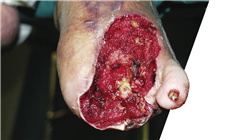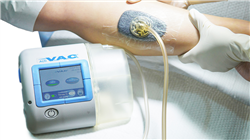University certificate
The world's largest faculty of nursing”
Introduction to the Program
Thanks to this 100% online Postgraduate diploma, you will master the most innovative techniques to treat vascular ulcers and optimize the quality of life of your patients”

In the field of Vascular Ulcers, Nursing professionals not only provide direct care, but also lead aspects such as treatment coordination and care management. Among the main tasks of these experts is the design of comprehensive treatments that address both the medical and psychosocial needs of patients. In this context, it is essential that nurses have a high level of knowledge about wound treatments, pain management techniques and the most effective strategies to improve circulation.
In this scenario, TECH implements a pioneering and very complete Postgraduate diploma in Nursing Care in Vascular Ulcers. Conceived by references in this area, the academic itinerary will delve into the most effective treatments for the approach of Venous Ulcers. Likewise, the agenda will focus on the specific care of these diseases, emphasizing the importance of continuous monitoring of the Ulcer to ensure effective healing and prevent complications. In this sense, the program will provide graduates with advanced strategies to prevent the appearance of Arterial Ulcers and Diabetic Foot. As a result, nurses will develop competencies to provide patients with dietary recommendations that promote healing.
In addition, this university program is based on the innovative Relearning learning system, powered by TECH. Thanks to this, nurses will reduce study hours and solidly consolidate the concepts addressed throughout this academic itinerary. All professionals will need is a device with an Internet connection (smartphone, computer or tablet) to access the virtual platform and the most dynamic teaching resources on the academic market. It should be noted that a prestigious International Guest Director will give rigorous master classes to delve into the progress in the treatment of Venous Ulcers.
A prestigious International Guest Director will offer an intensive Masterclass to bring you closer to the latest advances in Nursing Care in Vascular Ulcers”
This Postgraduate diploma in Nursing Care in Vascular Ulcers contains the most complete and up-to-date scientific program on the market. The most important features include:
- The development of practical case studies presented by experts in Wound Care
- The graphic, schematic and eminently practical contents with which it is conceived gather scientific and practical information on those disciplines that are indispensable for professional practice
- Practical exercises where self-assessment can be used to improve learning
- Its special emphasis on innovative methodologies
- Theoretical lessons, questions to the expert, debate forums on controversial topics, and individual reflection assignments
- Content that is accessible from any fixed or portable device with an Internet connection
You will deepen in the most effective techniques to reduce diabetic foot pain”
The program’s teaching staff includes professionals from the field who contribute their work experience to this educational program, as well as renowned specialists from leading societies and prestigious universities.
The multimedia content, developed with the latest educational technology, will provide the professional with situated and contextual learning, i.e., a simulated environment that will provide immersive education programmed to learn in real situations.
This program is designed around Problem-Based Learning, whereby the professional must try to solve the different professional practice situations that arise during the course. For this purpose, students will be assisted by an innovative interactive video system created by renowned and experienced experts.
Looking to stay on the cutting edge of the latest treatments to manage Vascular Ulcers? Achieve it through this program in only 540 hours"

An academic proposal that will allow you to update your knowledge at your own pace thanks to TECH's revolutionary Relearning system"
Why study at TECH?
TECH is the world’s largest online university. With an impressive catalog of more than 14,000 university programs available in 11 languages, it is positioned as a leader in employability, with a 99% job placement rate. In addition, it relies on an enormous faculty of more than 6,000 professors of the highest international renown.

Study at the world's largest online university and guarantee your professional success. The future starts at TECH”
The world’s best online university according to FORBES
The prestigious Forbes magazine, specialized in business and finance, has highlighted TECH as “the world's best online university” This is what they have recently stated in an article in their digital edition in which they echo the success story of this institution, “thanks to the academic offer it provides, the selection of its teaching staff, and an innovative learning method aimed at educating the professionals of the future”
A revolutionary study method, a cutting-edge faculty and a practical focus: the key to TECH's success.
The most complete study plans on the university scene
TECH offers the most complete study plans on the university scene, with syllabuses that cover fundamental concepts and, at the same time, the main scientific advances in their specific scientific areas. In addition, these programs are continuously being updated to guarantee students the academic vanguard and the most in-demand professional skills. In this way, the university's qualifications provide its graduates with a significant advantage to propel their careers to success.
TECH offers the most comprehensive and intensive study plans on the current university scene.
A world-class teaching staff
TECH's teaching staff is made up of more than 6,000 professors with the highest international recognition. Professors, researchers and top executives of multinational companies, including Isaiah Covington, performance coach of the Boston Celtics; Magda Romanska, principal investigator at Harvard MetaLAB; Ignacio Wistumba, chairman of the department of translational molecular pathology at MD Anderson Cancer Center; and D.W. Pine, creative director of TIME magazine, among others.
Internationally renowned experts, specialized in different branches of Health, Technology, Communication and Business, form part of the TECH faculty.
A unique learning method
TECH is the first university to use Relearning in all its programs. It is the best online learning methodology, accredited with international teaching quality certifications, provided by prestigious educational agencies. In addition, this disruptive educational model is complemented with the “Case Method”, thereby setting up a unique online teaching strategy. Innovative teaching resources are also implemented, including detailed videos, infographics and interactive summaries.
TECH combines Relearning and the Case Method in all its university programs to guarantee excellent theoretical and practical learning, studying whenever and wherever you want.
The world's largest online university
TECH is the world’s largest online university. We are the largest educational institution, with the best and widest online educational catalog, one hundred percent online and covering the vast majority of areas of knowledge. We offer a large selection of our own degrees and accredited online undergraduate and postgraduate degrees. In total, more than 14,000 university degrees, in eleven different languages, make us the largest educational largest in the world.
TECH has the world's most extensive catalog of academic and official programs, available in more than 11 languages.
Google Premier Partner
The American technology giant has awarded TECH the Google Google Premier Partner badge. This award, which is only available to 3% of the world's companies, highlights the efficient, flexible and tailored experience that this university provides to students. The recognition as a Google Premier Partner not only accredits the maximum rigor, performance and investment in TECH's digital infrastructures, but also places this university as one of the world's leading technology companies.
Google has positioned TECH in the top 3% of the world's most important technology companies by awarding it its Google Premier Partner badge.
The official online university of the NBA
TECH is the official online university of the NBA. Thanks to our agreement with the biggest league in basketball, we offer our students exclusive university programs, as well as a wide variety of educational resources focused on the business of the league and other areas of the sports industry. Each program is made up of a uniquely designed syllabus and features exceptional guest hosts: professionals with a distinguished sports background who will offer their expertise on the most relevant topics.
TECH has been selected by the NBA, the world's top basketball league, as its official online university.
The top-rated university by its students
Students have positioned TECH as the world's top-rated university on the main review websites, with a highest rating of 4.9 out of 5, obtained from more than 1,000 reviews. These results consolidate TECH as the benchmark university institution at an international level, reflecting the excellence and positive impact of its educational model.” reflecting the excellence and positive impact of its educational model.”
TECH is the world’s top-rated university by its students.
Leaders in employability
TECH has managed to become the leading university in employability. 99% of its students obtain jobs in the academic field they have studied, within one year of completing any of the university's programs. A similar number achieve immediate career enhancement. All this thanks to a study methodology that bases its effectiveness on the acquisition of practical skills, which are absolutely necessary for professional development.
99% of TECH graduates find a job within a year of completing their studies.
Postgraduate Diploma in Nursing Care in Vascular Ulcers
This Postgraduate Diploma in Nursing Care in Vascular Ulcers created by TECH Global University is a high quality qualification, specialized in the management of these lesions. This program, taught 100% online, offers a unique opportunity to delve into a crucial area of patient care, improving the quality of life of those who suffer from these conditions and optimizing clinical practices in the nursing field. Here, you will explore everything from the theoretical underpinnings to the practical applications of vascular ulcer care. You will learn about the anatomy and physiology of the vascular system, the pathological mechanisms that lead to ulcer formation and associated risk factors. This knowledge is essential to understand the complexity of vascular ulcers and develop personalized and effective care plans. Likewise, you will delve into the diagnosis and evaluation of vascular ulcers to perform a complete patient assessment, identify ulcer types and determine their etiology. You will acquire skills in the use of assessment tools and techniques such as measuring the ankle-brachial index, assessing blood flow and identifying signs of infection.
Specialize in vascular ulcer nursing care
The online modality of the course offers flexibility for you to manage your time effectively, accessing educational materials from anywhere and at any time. This methodology allows you to combine your specialization with other professional and personal responsibilities, facilitating the continuous development of skills and knowledge. In addition to technical content, the program addresses critical aspects such as patient education and health promotion. You will learn how to develop patient and caregiver education programs focused on ulcer prevention and self-care. You will also cover interdisciplinary coordination and teamwork, which are essential to provide comprehensive and effective care. Upon completion, you will be prepared to assume key roles in the healthcare setting. You will be able to work in hospitals, clinics, primary care centers and nursing homes, applying your expertise in specialized vascular ulcer care. Your advanced training will position you as a leader in a growing field that is crucial to the well-being of patients - enroll now and put your career on the path to more effective and humane care!







